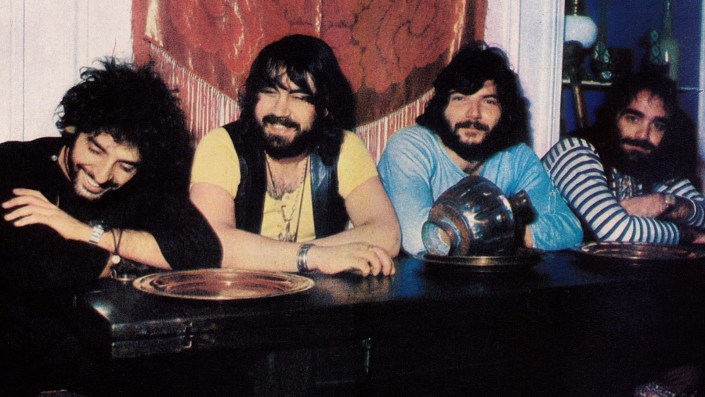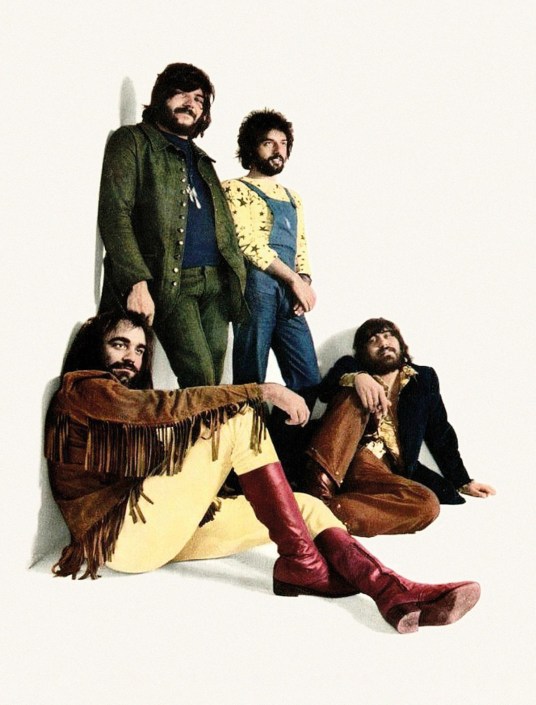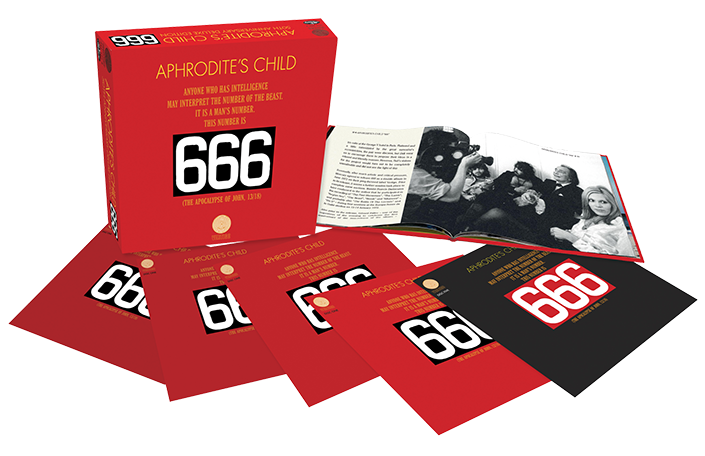This is the English translation of online article from the AthensVoice, published on October 23, 2024
Aphrodite's Child: Reissue for "666", under the "gaze" of Vangelis Papathanassiou
A masterpiece of Greek music and a top album in progressive rock genre
By Vyronas Kritzas

Aphrodite's Child: The album “666 – The Apocalypse Of John” is re-released and will be available on November 8th - What this special edition will include
Their third album Aphrodite's Child, the famous "666", was one of the leading albums of the early pop and rock era that fulfilled a very specific condition: challenging the religious status quo, which was quite provocative for its time. But it wasn't the first; music from English-speaking countries had long been inspired by the teachings of the Bible. However, from the 60s onwards, many artists began to cautiously criticize organized religion. Social changes in the post-war period, political rights’ movements, but also the significant progress in space exploration, were factors that led many people, especially artists, to adopt a critical stance towards religion, questioning various aspects of it. Bob Dylan criticized religious exploitation to justify violent practices in songs like “With God on Our Side” and “Highway 61 Revisited”. Similarly, Simon & Garfunkel, who were particularly influential at that time, offered a cynical reflection on their song "Blessed" drawing from the prevailing atmosphere. The dictatorial regime in Greece at that time, as it can be understood, was certainly not the "ideal" environment place for such discussion. The controversial - to say the least - aesthetics, the abhorrence for foreign culture and all things challenging social norms, repulsed many young conscious citizens of the time, who sought alternative outlets within their limited means.
Vangelis Papathanassiou and Demis Roussos were two prominent names in the Greek scene of the early 60s, a scene that struggled to differentiate itself from traditional Greek folk sounds, drawing inspiration from Western pop references. Papathanassiou 's first success comes with the band Forminx, who achieved popularity with the iconic single "Jeronimo Yanka", under the manager and lyricist Nikos Mastorakis. Likewise, Roussos shows the first samples of his commanding voice, through his participation in bands such as Idols and We Five. The two musicians, joined by guitarist Argyris Koulouris and drummer Loukas Sideras, recorded a two-song demo, marking the beginning of Aphrodite's Child. Impressed by the demo, representatives from Philips Records suggested they try their luck in England. The band traveled without Argyris Koulouris, who stayed in Greece due to his military obligations. However, the rest were denied entry to England, as there is a problem with their work permit. Thus, in 1968 they found themselves in Paris, where they signed with Mercury Records, a Philips’ branch. The protests of the time in the French capital openly challenged traditional conservative values, putting political and labor rights on the agenda, became a symbol of youth counterculture and influenced later literary, philosophical and artistic movements. This was the ideal environment for three restless young men eager for change and wanting to express their desires through their music.

Aphrodite's Child Journey towards to 666

Like many groups in the late 60s, one could say that Aphrodite's Child seemed to grasp early on that psychedelic pop-rock sound was nearing the end and that the new decade would embrace more complex themes and dark soundscapes. A classic example of that change was Genesis who quickly found their sound on the classic “Trespass”, in contrast to their debut “From Genesis to Revelation”, which showed that they were still searching for an identity. The difference is that Aphrodite 's Child caught up and released two very good psychedelic rock albums, "End of the world” (1968) and “It’s five o ' clock” (1969), with highlights like their hit, “Rain and Tears". Their transition to more complex forms and darker lyrics was smooth, however the influences from the Greek musical tradition, as well as Vangelis Papathanassiou’s given genius composition approach exceeded all expectations. "666" was released in 1972, having been recorded two years earlier, with the band already disbanded. Today, it is featured in any serious list of the best progressive rock albums of all time, alongside masterpieces like Pink Floyd’s “The Dark Side of the Moon” and King Crimson’s “In the Court of the Crimson King”. The imposing three-digit number on the cover provoked reactions from conservative circles of the time. The lyrics draw inspiration from the Book of Revelation of John, a book particularly rich in symbolism and interpretations, central to eschatology, and influential on literature and popular culture for centuries. However, Aphrodite’s Child approach carefully decodes partially the Bible text, making it accessible to a wider audience and adapting it to the context of a modern-for-the-time musical approach. The adaptation of the Apocalypse of John by a rock band is considered by many as an underestimate of the work, however its popularization and performance as a "rock opera" seems rather to honor it. "666" is considered as the crown of albums of common theme (also known as concept albums), paving the way for records like David Bowie’s “Ziggy Stardust” and Pink Floyd’s “The Wall” years later. Furthermore, the album’s long duration and its several interludes will not prevent several songs from the album to gain hit status over the years. The record hits the record store shelves in June 1972 through Vertigo Records, a Mercury division specializing in classical rock of the era and its progressive side.

The songs and the notable collaborations on the Album
“We got the System, to fuck the System!” is proclaimed in the album’s introduction, setting a clear message for its content. Art, since ancient times, has been intertwined with challenge and artists having the displacement of the participants of "666", clearly know this. It is the ideal passage for the first great track of the album "Babylon", an excellent rock elegy, considered as one of the best ever composed by our compatriots. Another beautiful interlude, “Loud Loud Loud”, precedes the mystical “The Four Horsemen”, where Demi Rousso’s vocals stand out. “The Lamb” remains up to date one of the best examples of the combination of rock with Greek tradition’s elements, while “The Beast” recalls the great early moments of Jethro Tull. "Altamon" is placed among the album's top songs, but at that time, it alluded directly to the disastrous Rolling Stones concert at Altamont Speedway Free Festival, in 1969, where four people died. As this great album reaches its finale, “All the Seats Were Occupied”, becomes Aphrodite's Child’s 20-minute epic, just as the elite of the progressive rock genre had in those years. But a special mention needs to be made to the song with the symbol of infinity, with the simulation of an orgasm by Irene Pappa, which made even the last employee of Mercury Records to lose its sleep. Vangelis Papathanassiou's piano closes the album ideally, with "Break" soothing the psychological and physical tension that preceded it, completing in the best way one of the most complex, quality and classic creations of the Greek pentagram.

"666" would have stood on its own as a musical masterpiece, but the numerous external contributions gave the album something more, providing it a cult status over time. Haris Chalkitis, father of the popular singer Victoria Chalkitis, who passed away very recently and more specifically on October 9th, gave a special color with his saxophone. The narration that stands out in the record is definitely that of "Ofis", with the commanding stentorian voice of the late Greek painter Yannis Tsarouhis leaving no room for doubt. It is of course impossible not to make a specific reference to the provocative "Infinity", where great Greek actress Irene Pappas rhythmically repeats the phrase “I was, I am, I am to come”, in an expression of sexual pleasure, as well as the pain of childbirth . But perhaps the top contribution to the record, beyond that of the members of Aphrodite's Child per se, was that of the well-known Greek director and screenwriter Kostas Ferris. Ferris and Papathanassiou were the ones who were inspired and created the concept of "666", with the latter fully taking over the lyrical part. For the unsuspecting listeners, the influence of records like Beatles’ “Sgt Peppers Lonely Hearts Club Band” and The Who’s “Tommy” is obvious.
The album was released in June 1972. However, the musical differences between (mainly) Papathanassiou and Roussos do not leave much room for continuation. The first one wants to continue the approach of complex, experimental, avant-garde musical themes, while Demis Roussos wants to continue on the path of psychedelic pop, with which the band firstly became known. Aphrodite 's?? Child had already disbanded when the record was released, however over the years "666" was rightfully considered the pinnacle of their career and one of the best examples of rock music that ever derived from our country.
The path of the participants of the album after the dissolution of Aphrodite' s Child

Despite the end of the group, the road to success for the members of "666" had just opened. In 1975 and as the dictatorship of the Colonels was of the past, Vangelis Papathanassiou settled in London. There he begins a brilliant personal career based on orchestral music; a career that will make him famous worldwide. Among the very good instrumentals albums and soundtracks for the cinema , classic themes for films such as “Blade Runner”, “Chariots of Fire” and “1492: Conquest of "Paradise" are highlighted. He will meet Greek rock again in another stage masterpiece, "Phos" by Socrates by late Giannis Spathas and Antonis Tourkogiorgis, which will be released in 1976. Vangelis, as Papathanassiou was known worldwide, passed away on May 17, 2022 . Demis Roussos was established as one of the greatest Greek singers of all time, with his sales now exceeding 70 million copies worldwide. Songs like “Goodbye, My Love, Goodbye”, “Forever and Ever”, “My Friend the Wind” and “Velvet Mornings (Drigi Driggy Mana mou)” are part of the great performer’s immense legacy, who passed away in January 2015. The two men collaborated again after Aphrodite's Child, in various individual cases. The most characteristic was "Tales of the Future", from the Blade soundtrack Runner
Reissue of the historic album by Minos EMI
On November 8, 2024, a new ultra-luxurious remastered version of the legendary album will be released. The different versions of the remastered version include 4 CDs, 1 Blu Ray Box Set and Double Black Vinyl. The Box Set, in turn, includes, among others, the remastered version of the original album released in 1972, the remastered version of the Greek mix of the 1974 album, as well as a rare interview of Vangelis Papathanassiou on the French TV show Discorama. More than half a century after its release, "666" is widely considered as one of the most accomplished and influential records ever released by the Vertigo label, the crown jewel of the "swirl" period between 1969 and 1973. Finally, the release will contain a book with a new essay and authentic interviews of the band, as well as unique photographs collected from various sources and archives of Vangelis Papathanassiou from all over Europe, shortly before his death.

Aphrodite's Child – 666 Original Album Tracklist
Disc 1:

1. The System (0:23) 2. Babylon (2:51) 3. Loud, Loud, Loud (2:37) 4. The Four Horsemen (5:57) 5. The Lamb (4:34) 6. The Seventh Seal (1:30) 7. Aegean Sea (5:25) 8. Seven Bowls (1:25) 9. The Awakening Beast (1:07) 10. Lament (2:55) 11. The Marching Beast (2:00) 12. The Battle of the Locusts (0:56) 13. Do It (1:45) 14. Tribulation (0:32) 15. The Beast (2:33) 16. OFIS (0:17)
Disc 2:
1. Seven Trumpets (0:30) 2. Altamont (4:45) 3. Loud, Loud, Loud (2:37) 4. The Wedding of the Lamb (3:35) 5. The Lamb (4:34) 6. The Capture of the Beast (2:15) 7. ∞ (Infinity) (5:16) 8. Hic Et Nunc (3:00) 9. All the Seats Were Occupied (19:27) 10. Break (2:55)
Article by Babis Kaloyannis. Published online in AthensVoice, October 23, 2024

